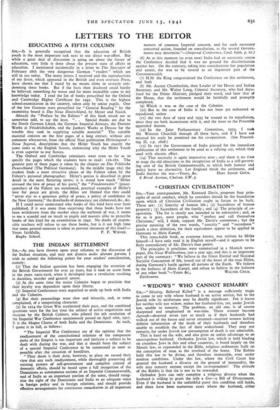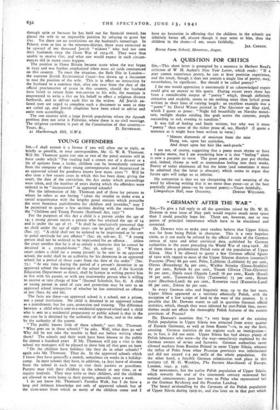" WIDOWS " WHO CANNOT REMARRY
SIR,â" Missing, Believed Killed " is a message sufficiently tragic to come to any wife whose husband is on active service, but to the Jewish wife its misfortune may be doubly significant. For it leaves her neither wife nor widow, makes her husband-less, yet, under Jewish law, unable to remarry. The problem, an old one, is of course sharpened and emphasised in war-time. These women become Agunahâdeserted wives just as much as if their husbands had walked out of the house and never returnedâmarried women lacking definite information of the death of their husbands and therefore unable to establish the fact of their widowhood. They may not remarry, for under Jewish law presumption of death is not admissible.
This is hard on the wife, and also gives an unfair advantage to an unscrupulous husband. Orthodox Jewish law, which is held binding on countless Jews in this and other countries, is based largely on the Mosaic law, as expounded in the Bible, religious ordinances built on the conception of man as the overlord of the home. The Rabbis hold this law to be divine, and therefore immutable, even under modern conditions. Under this law, where the Civil Court has granted the husband a divorce on the ground of immorality, the wife may remarry anyone except the co-respondent! The attitude of the Rabbis is that sin is not to be rewarded.
Orthodox Jews can only complete a religious divorce when the husband is willing to grant the wife a Getâa Bill of Divorcement. Even if the husband is the unfaithful party this condition still holds, and there have been numerous cases where the husband, either through spite or because he has held out for financial reward, has placed the wife in an impossible position by refusing to grant her Get. Yet there are no restrictions on the husband's remarriage. In Poland, even as late as the nineteen-thirties, there were estimated to be upward of ten thousand Jewish " widows " who had not seen their husbands since the Great War of 1914-18. They were thus unable to receive Get, and what one would expect in such circum- stances did in many cases happen.
The position in Great Britain became acute when the war began in 1939 and was further emphasised when mass air raids commenced on this country. To meet the situation, the Beth Din in Londonâ the supreme Jewish Ecclesiastical Courtâhas drawn up a document to ease the position of the wife. This is in effect an instruction by the husband to a nominee that, after one year from the date of the official proclamation of peace in this country, should the husband have failed to return from war-service to his wife, the nominee is empowered to write a Get on his behalf to effect a religious divorce forthwith, and to deliver such Get to the widow. All Jewish en- listed men are urged to complete such a document as soon as they are called up, and Jewish chaplains have been asked to advise and assist men accordingly.
The one country with a large Jewish population where the Agunah problem does not arise is Palestine, where there is no civil marriage. The religious ceremony is part of the Constitution of that country.â



























 Previous page
Previous page